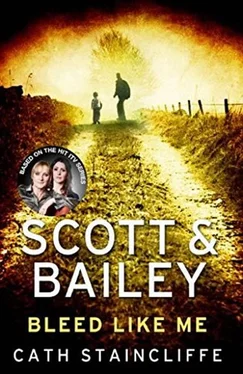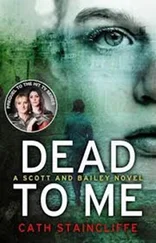‘How?’
‘The knife. Cut my throat.’
‘Why?’ Janet asked.
His shoulders rose, then fell. ‘For the best,’ he said. ‘It had all gone to shit. We were losing the pub, the bank was on my back, bleeding us dry. Better off out of it,’ he said, quietly emphatic. Not a scintilla of doubt there that Janet could discern, but complete belief that the path he had chosen was the right one. For some killers, along with the confession came guilt and grief and expressions of sorrow for what they had brought down upon the victims and their families. There was none of that with Owen Cottam. No remorse at all.
‘Are you sorry?’ Janet asked him.
‘Sorry I couldn’t finish it,’ he said, regret heavy in his voice, but not malice. ‘If you hadn’t stopped me-’
‘You’d have done what?’ Janet said.
‘Gone with my lads.’
‘Why did you wait?’ Janet said. ‘Once you’d got to Lundfell?’
He blinked slowly as though it was a stupid question. ‘I had to do it right. The three of us.’
‘Do what?’
‘Drown them, hang myself. Together.’
‘That’s what the bin bags were for?’
He nodded. ‘There were some stones near the lock, to weigh them down. We should have gone together,’ he said. ‘We should all have been together.’
‘The deaths at your home, the pathologist tells us they were very quick. The victims would not have suffered for long, if at all. Yet you were prepared to let Theo and Harry die of thirst and dehydration, left them alone and unprotected from vermin, predators, cold and thirst. Can you explain that to me?’
‘That’s your fault,’ he said. ‘The police, you lot interfering. You messed it all up.’ His eyes were flinty. ‘That wasn’t meant to happen. You made that happen.’
Shifting the blame. And you sat there and allowed it, Janet thought. Thank God they had saved the boys. How much more grotesque would it have been if they’d lain there undiscovered, imprisoned in the old barge until they died.
‘You cared more about yourself, about seeing your plan through, than the suffering of those children,’ she said.
‘I love my children,’ he said dangerously.
‘No,’ she said.
‘I love them,’ he insisted, but there was bitterness in his eyes and the edges of his lips were white with tension.
‘That’s not love,’ Janet said.
She had it – his confession. I killed them. It must be enough to pass the threshold test, meaning the case was likely to result in a successful prosecution, but she had to get the say-so of a solicitor from the Crown Prosecution Service before she could charge him.
Cottam was taken back to his cell while Janet completed her case summary and then sought out the CPS solicitor. She gave her the written file and waited while she read it.
‘That’s good,’ the solicitor concluded. ‘Happy with that.’ And she signed the form.
Janet took it through to the custody officer and waited while he typed up the charges.
When everything was ready, Owen Cottam was brought through.
Janet relaxed her shoulders, waited a moment before she spoke. ‘Owen Cottam, you are charged that on the tenth of October 2011, at Oldham in the county of Greater Manchester, you did murder Pamela Cottam contrary to common law. You do not have to say anything, but it may harm your defence if you fail to mention now something which you may later rely on in court. Anything you do say may be given in evidence. Do you understand?’
‘Yes,’ he said, a single word, the slightest tremor in his voice. He was trembling, the muscles shifting under the skin on his face, but his expression was bland, empty. Janet had no idea what was going on in his head.
Janet went on to the second charge. ‘Owen Cottam, you are charged that on the tenth of October 2011, at Oldham in the county of Greater Manchester, you did murder Penny Cottam contrary to common law. You do not have to say anything, but it may harm your defence if you fail to mention now something which you may later rely on in court. Anything you do say may be given in evidence.’
As she continued to read out the charges, Janet thought that this was what it all led up to, all the speculating and hunting for information, all the accumulation of evidence and typing up of reports, all the hours of careful questioning and testing. To this. The moment when she could charge someone with the crime. And when those left devastated and bereaved could begin to see the prospect of justice.
She got to the fifth and final charge. ‘Owen Cottam, you are also charged that between the tenth of October 2011 and the fourteenth of October 2011 at Wigan in the county of Greater Manchester you did attempt to murder Harry Cottam, contrary to section one of the Criminal Attempts Act 1981. You do not have to say anything, but it may harm your defence if you fail to mention now something which you may later rely on in court. Anything you do say may be given in evidence.’
Owen Cottam made no comment and the custody officer noted that and indicated to Janet that they were done.
Cottam was led away.
I killed them. A normal bloke, she thought, an average family man. Nothing remarkable about him. A settled, uneventful life. Nothing that could ever have pointed to his having the capacity to slaughter his family. Not like the rest of the criminals they dealt with, their lives chaotic, their families fractured, haunted by abuse and neglect and poverty. Seeking solace in drink and drugs and confusing violence with love.
Janet didn’t believe Owen Cottam had loved too much; rather that he’d mistaken possession, ownership, for love. Seeing his wife and children as chattels without free will and his own needs as paramount.
The cell door shut behind him with a clang that echoed along the corridor.
‘Nice one, Janet,’ said the custody sergeant.
Janet smiled and gave a nod. Glad it was done, glad it was all over.
‘Gill thinks the grandmother will take the kids,’ Janet said.
Rachel took another piece of garlic bread, dipped it in the oil and balsamic vinegar, savoured the tang. ‘They’ll not remember, will they? That age? Though she’ll have to tell them eventually.’
‘Doubt it. Though I can remember being in my high chair and my mum dancing. She reckons I was only two then.’
‘I don’t remember anything before school,’ Rachel said, partly to stop Janet asking. ‘Do you want that last bit?’ She pointed at the bread.
‘You have it,’ Janet said, ‘you need it more than I do. So – have you decided on your new kitchen?’
‘What?’ Then Rachel remembered in a rush. ‘Oh, no, not bothering.’
Janet nodded, filled their glasses. ‘I wanted to tell you,’ she said, ‘me flying off the handle, being under the weather…’
Rachel froze, expecting cancer or some wasting disease. Imagining Janet in a hospital bed shrinking away. This their Last Supper.
‘… I’m fine.’ Janet laughed. ‘Least, I’m pretty sure I am. It’s the menopause.’
‘Oh, God,’ said Rachel. ‘So you’re turning into an old bag?’
‘It’s the solidarity I love,’ Janet said sarcastically. She took a drink. ‘Just a new phase of life.’
‘You think?’ Rachel wasn’t so sure. ‘From what I hear, it’s all dry skin and facial hair and bingo wings, isn’t it?’
‘And freedom from periods, the acquisition of a certain age and authority, perhaps,’ Janet said. ‘Your time will come.’
Rachel had another mouthful of wine. ‘Godzilla’s forgiven me,’ she said, ‘sort of.’
‘Good. No more racing into burning buildings then, eh? I turn my back for five minutes…’ Janet said, mock scolding.
‘Sod off,’ Rachel said. She sat back from the table while the waiter took their starter plates away.
Читать дальше












